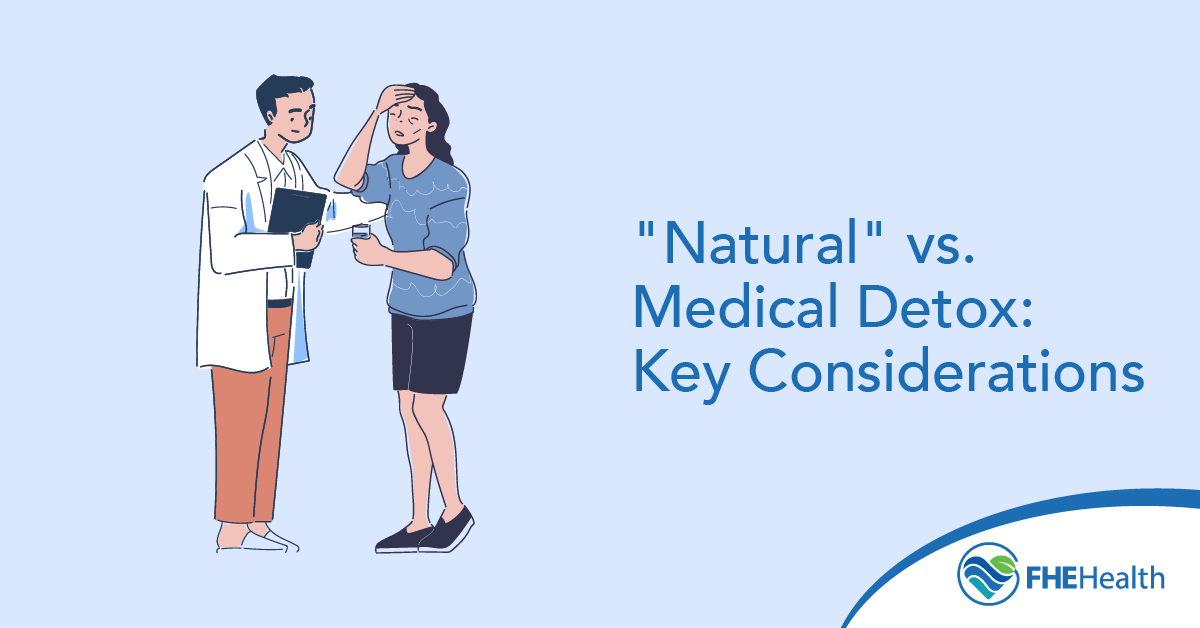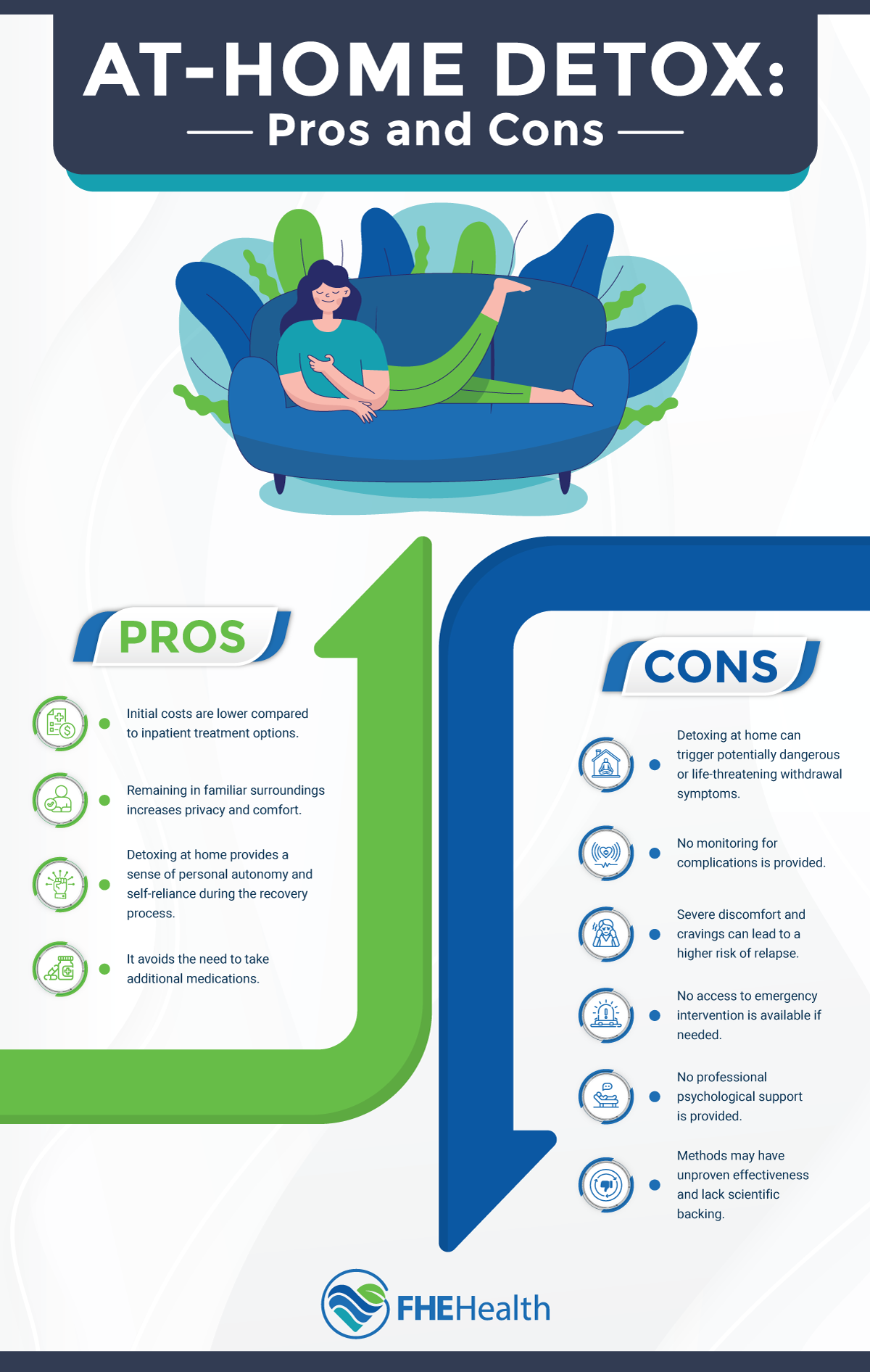
When facing addiction, the decision to seek treatment begins with the method of detoxification. As you explore recovery options, you may encounter information about natural drug detox methods that promise a gentler alternative to medical approaches. But what constitutes a natural detox, and how does it compare to medically supervised treatment? This comprehensive guide explores the key differences, risks and benefits of each approach to help you make an informed decision about the safest and most effective path to recovery.
What Is Natural Drug Detox? Pros and Cons
Natural drug detox typically refers to the process of letting your body clear a substance without medical intervention or prescription medications. This approach often involves:
- Stopping substance use abruptly and completely
- Using home remedies, herbal supplements or natural products
- Following specific diets and hydration regimens
- Incorporating exercise, meditation and other wellness practices
- Attempting drug detox at home without professional oversight
Pros of Natural Detox
Natural detox approaches offer lower initial costs compared to inpatient treatment options and let you maintain the privacy and comfort of remaining in familiar surroundings. Many people are drawn to this method because it provides a sense of personal autonomy and self-reliance during the recovery process. Additionally, some people prefer natural detox because it lets them avoid taking additional medications during their recovery journey.
Cons of Natural Detox
Despite its perceived benefits, natural detox carries significant drawbacks. The process can trigger potentially dangerous or life-threatening withdrawal symptoms, especially when detoxing from alcohol, benzodiazepines or opioids. Without medical supervision, there’s no monitoring for complications that might arise during withdrawal. Additionally, the severe discomfort and cravings experienced during unsupervised detox can lead to a higher risk of relapse.
Also, you won’t have immediate access to emergency intervention if needed, and you’ll miss out on professional psychological support during this highly vulnerable time. Plus, many of the home remedies and natural supplements promoted for detox have unproven effectiveness and lack scientific backing.
When attempting alcohol detox at home or detoxing from other substances without medical supervision, you face serious risks to your health and long-term success.

The Medical Detox Process and Its Benefits
Medical detox takes place in a supervised health care setting, usually a dedicated detox facility, addiction treatment center or hospital, where medical professionals monitor and manage your withdrawal symptoms.
The medical detox process typically includes:
- Comprehensive assessment. Medical history review, substance use evaluation and identification of co-occurring conditions
- Personalized treatment planning. Development of a tailored approach based on substances used, usage patterns and individual health factors
- Medication management. Prescribed medications to reduce withdrawal symptoms, prevent complications and minimize discomfort
- 24-7 monitoring. Continuous observation of vital signs and withdrawal symptoms
- Psychological support. Counseling and emotional support during the detoxification process
- Transition planning. Preparation for the next phase of addiction treatment
Medical detox uses FDA-approved medications specifically designed to manage withdrawal symptoms and reduce cravings. For example, medications such as methadone, buprenorphine and naltrexone may be used for opioid detox, while benzodiazepines are often prescribed to manage alcohol withdrawal symptoms.
Benefits of Medical Detox
- Safer management of withdrawal symptoms
- Reduced discomfort, which decreases the likelihood of returning to substance use
- Immediate medical intervention if complications arise
- Access to medications to ease withdrawal symptoms
- Professional psychological support during a challenging period
- Higher completion rates compared to unsupervised attempts
- Seamless transition to ongoing treatment
Comparing the Safety and Effectiveness of Both Methods
When weighing natural drug detox against medical approaches, safety and effectiveness should be your primary concerns.
Safety Considerations
Attempting a natural home drug detox for certain substances can be dangerous or even fatal. For example, withdrawal can:
- Progress to delirium tremens, which has a mortality rate of up to 37% without treatment
- Cause seizures, psychosis and potentially life-threatening complications
- Result in extreme discomfort that, while rarely fatal, significantly increases relapse risk
- Trigger severe depression and suicidal thoughts
Without medical supervision, there’s no way to predict how severe your withdrawal symptoms may become or how quickly they could escalate.
In contrast, medical detox provides important safeguards:
- Continuous monitoring of vital signs
- Immediate intervention for complications
- Medication management to prevent severe withdrawal symptoms
- Professional assessment of co-occurring medical or psychiatric conditions
- Emergency medical equipment and trained staff are readily available
Effectiveness Considerations
Medical detox leads to better outcomes than unsupervised attempts. In fact, medically supervised detoxification is often a necessary first step in treatment and substantially improves the likelihood of continuing with comprehensive addiction treatment.
Addicts who attempt natural detox without support have notably higher relapse rates than those who receive medical supervision. The discomfort of withdrawal often leads to resumed substance use as a form of self-medication.
Medical detox programs have much better completion rates compared to unassisted attempts at quitting. The support, comfort measures and medication provided in medical detox help people successfully navigate the challenging withdrawal period.
Choosing the Right Detox Approach for You
Making the right detox choice depends on several factors specific to your situation. Medical detox is strongly recommended if you:
- Are dependent on alcohol, benzodiazepines or opioids
- Have a history of severe withdrawal symptoms
- Have co-occurring medical or mental health conditions
- Attempted to quit before and experienced relapse
- Have been using substances in high doses or for a long period
- Don’t have a strong support system at home
Factors to Consider
- Substance type and usage pattern. Different substances create specific withdrawal risks.
- Medical history. Existing health conditions can complicate withdrawal.
- Previous detox attempts. Prior experiences can inform current needs.
- Support system. Available emotional support during the process.
- Living environment. Stability and a substance-free environment.
- Financial considerations. Insurance coverage and payment options.
- Long-term recovery goals. How detox fits into your complete treatment plan.
Remember, detox is just the beginning of the recovery journey. Detoxification alone, without follow-up treatment, rarely leads to long-term sobriety. The most effective approach combines professional medication detox with comprehensive addiction treatment.
Get Help Today
If you or a loved one is struggling with addiction, don’t face detox alone. FHE Health offers comprehensive, medically supervised detoxification services and a compassionate team of addiction specialists ready to support you through every step of the process. Our evidence-based approach ensures your safety while providing the foundation for lasting recovery. Contact FHE today to learn more about our detox programs and how we can help you begin your journey to a substance-free life.






